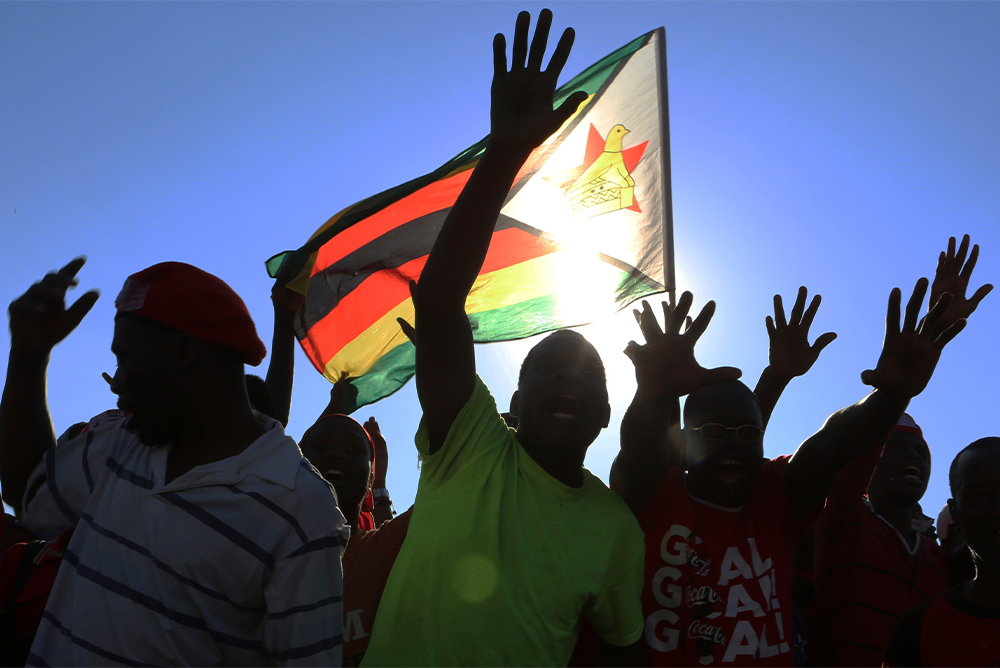
George Orwell’s 1945 novel Animal Farm speaks directly to Zimbabwe’s readers in 2024—especially with a new translation, writes Beaven Tapureta of Writers International Network Zimbabwe. Courtesy of AP Photo/Tsvangirayi Mukwazhi.
I began to notice Animal Farm references proliferating in Zimbabwe in 2008.
That was the year hyperinflation nosedived the economy, and long-time leader Robert Mugabe felt threatened enough by a newly formed opposition party that he silenced its supporters.
In the years since, writers and independent media have repeatedly turned to Animal Farm as a way to illuminate our political reality—even after Mugabe’s 2017 ousting. Last year, a group of Zimbabwean writers published the first-ever Shona translation of it, Chimurenga Chemhuka or Animal Revolution. Chimurenga Chemhuka, published by House of Books, strategically appeared on the literary stage in the lead-up to last August’s general elections to encourage Zimbabwean readers to think critically about politics at home and abroad.
Animal Farm follows a group of anthropomorphized barnyard animals who gather to overthrow their oppressive human masters and set up an egalitarian society on the farm. However, power-loving pigs take advantage of internal divisions to subvert the revolution. Concluding that “all animals are equal, but some animals are more equal than others,” the pigs install a dictatorship led by the despotic pig Napoleon.
George Orwell intended the book to be a commentary on Joseph Stalin’s betrayal of Russia’s Bolshevik revolution. But since Animal Farm was published in 1945, the story’s message has served as a bitter pill to all Napoleons threatened by freedom and equality, including in Zimbabwe.
After the end of white-minority rule in 1980, Mugabe, like Napoleon, seized the reins and installed himself as the head of the country for the next three decades.
When a people-powered movement finally pressured Mugabe to step down, euphoria filled streets and homes. Only it did not last long. People had expected a government of national unity would run the country until the house was in order, but new leaders ignored that. The people of Zimbabwe came to feel they had been neglected by the same leaders they had united with to remove a dictator.
Orwell’s tale is a powerful reminder of how freedom decomposes when it’s entrusted to the hands of the selfish.
Over and over again, we see people unite in times of revolution—but once the goal is collectively achieved, greed and power crash the original dream. Who in Africa did not hope that after colonialism and apartheid, the people would enjoy true independence?
Petina Gappah, a lawyer and leading Zimbabwean writer, said that she first hatched the idea for a Shona translation of Animal Farm a few years ago. She and the rest of the team behind the effort sought to do more than put Orwell’s book in the Shona vernacular—they wanted it to feel Zimbabwean.
“Reading [Chimurenga Chemhuka] is like reading a story told in Shona to a Shona audience. This makes it our story, and the similarities also inform the reader that human beings are almost the same in deeds in spite of differences in skin color and geographical space,” another translation team member, Tinashe Muchuri, a Shona author, translator, poet, and journalist, told me.
The settings and places of traditional Shona folktales are vague, just like in Orwell’s tale. However, the translators used different Shona dialects to appeal to a local readership here. In his article last year, Zimbabwean literary scholar Tinashe Mushakavanhu called attention to the number of dialects employed in the book: “Though Chimurenga Chemhuka is mainly in standard Shona, its characters speak a medley of different Shona dialects—such as chiKaranga, chiZezuru, chiManyika—plus a smattering of contemporary slang.”
Through the translators’ creativity, the original tale gained additional meanings as well. In most African folklore, and many other cultures, the pig represents selfishness. This makes the actions of Napoleon, and his fellow pigs, even more resonant.
Chimurenga Chemhuka is part of a larger renaissance of literary translation happening in Zimbabwe today, which is often centered on works about human rights. Ignatius Mabasa, an illustrious Zimbabwean writer and translator, has said that he sees translating as a “form of liberation struggle” that furthers a decolonized mindset. His translations include Finnish author Tove Jansson’s 1962 “The Invisible Child” (“Mwana Asingaonekwe”), which tells the story of a girl named Ninny who became invisible after her caretaker mistreats her, and Zimbabwean novelist Tsitsi Dangarebga’s Nervous Conditions (Kusagadzikana). First published in English in 1988, Nervous Conditions tells the story of Tambudzai Sigauke, who dreams of escaping a life of poverty in rural Rhodesia (now Zimbabwe) in the 1960s to pursue an education.
Recently, I attended a writers’ retreat in Nyanga, here in Zimbabwe, where I discussed today’s translation efforts with Blessing Musariri, a Zimbabwean children’s book author, poet, and screenwriter. Musariri said that she sees translation as a way to begin a global conversation in the Shona vernacular. “Translation is a great way to expand on the literary lexicon of works written in Shona. International literature usually deals with broader themes and ideas than what we might write about specifically in our own language,” Musariri told me.
Animal Farm is an important example of this. Zimbabweans have long been conscious of Orwell’s novel, but reading Chimurenga Chemhuka offers a chance to fuse the novel’s 1945 message with present-day politics.
Now it’s only a matter of making sure these translated works are made accessible to their intended audience.
Distribution must not be limited to critics and intellectuals in offices and universities. Instead, publishers must be diligent about getting books in local bookstores and libraries, and thus to the ordinary Zimbabwean—the very people whose lives these stories reflect.




Send A Letter To the Editors